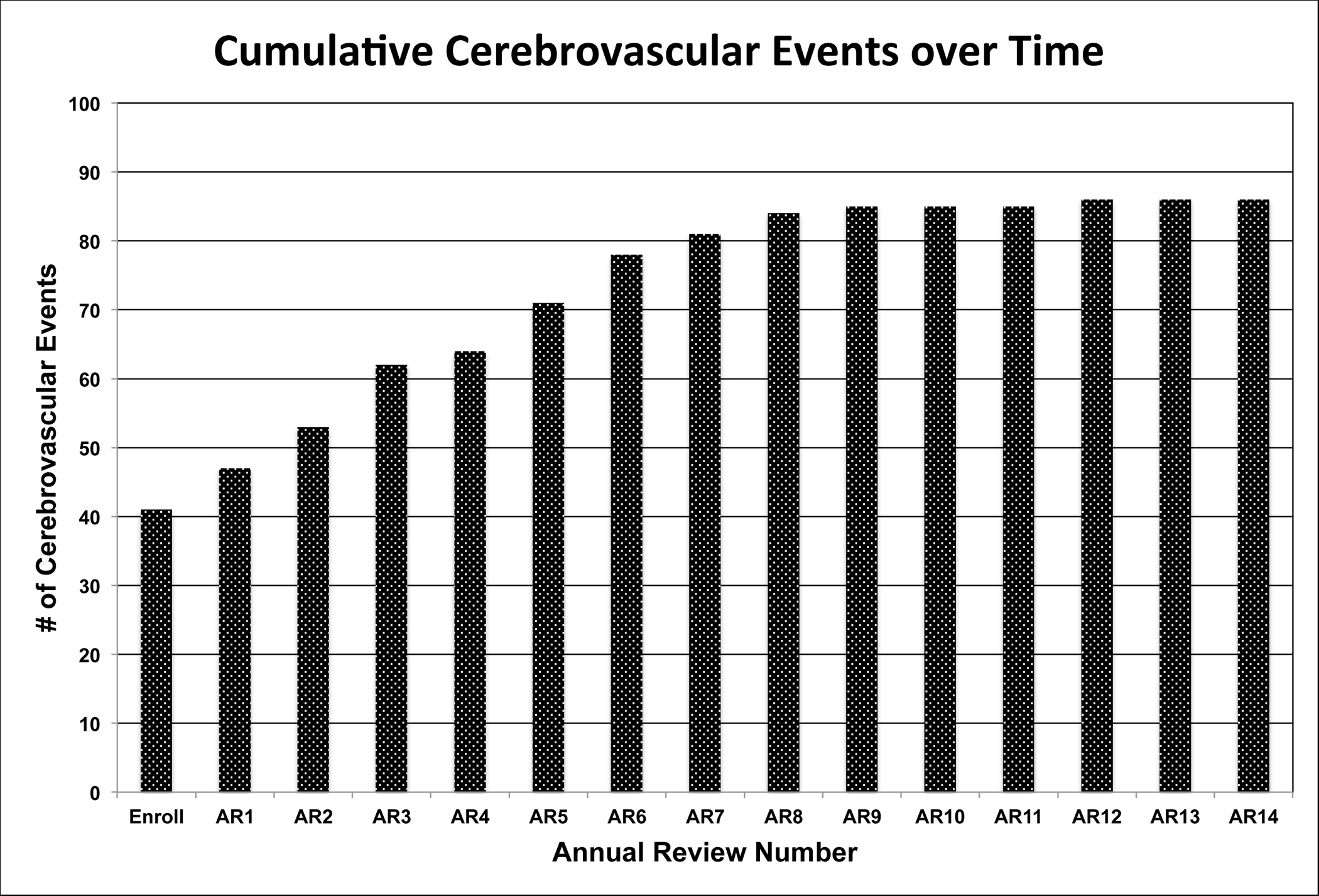Session Information
Date: Tuesday, November 10, 2015
Title: Systemic Lupus Erythematosus - Clinical Aspects and Treatment Poster Session III
Session Type: ACR Poster Session C
Session Time: 9:00AM-11:00AM
Background/Purpose: Neuropsychiatric (NP) disease in
patients with SLE includes cerebrovascular events. We determined the frequency,
characteristics and attribution in a large, multi-ethnic/racial, inception
cohort of SLE patients.
Methods: A prospective study of new onset SLE
patients was performed by an international network of 32 academic centers in 11
countries. Patients were evaluated at enrollment and annually for up to 14
years. Data were collected at each assessment on demographic and clinical
manifestations, medications, SLE disease activity index-2000 (SLEDAI-2K) and
Systemic Lupus International Collaborating Clinics (SLICC)/ACR damage index
(SDI). Nervous system events were recorded using the ACR case definitions for
19 NP syndromes. These include cerebrovascular events and consisted of: (i)
Stroke; (ii) Transient ischemia; (iii) Chronic multifocal ischemia; (iv)
Subarachnoid and intracranial hemorrhage; (v) Sinus thrombosis. Pre-defined
rules determined the attribution of NP events to SLE and non-SLE causes.
Results: Of 1,826 SLE patients, 88.8% were
female, 48.8% Caucasian with mean±SD age 35.1±13.3
years. At enrollment, mean SLE duration was 5.6±4.2
months, SLEDAI-2K was 5.3±5.4, SDI was0.31±0.74. The mean follow-up was 5.8±3.8
years. Over the study 912 (49.9%) patients
had 1,770 NP events of which 537 (30.3%) were attributed to SLE. Cerebrovascular
events were the fourth most frequent NP event: 69/1,826 (3.8%) patients had 86
events of which 82/86 (95.3%) were attributed to SLE. Eleven (15.9%) patients
had ≥ 2
cerebrovascular events (9
attributed to SLE and 2 to non-SLE factors) and other NP events occurred concurrently
in 42/69 (60.8%) patients. The predominant
cerebrovascular events were stroke [45/86 (52.3%)] and transient ischemia
[23/86 (26.7%)] followed by subarachnoid and intracranial hemorrhage [9/86
(10.5%)], chronic multifocal ischemia [7/86 (8.1%)] and sinus thrombosis [2/86
(2.3%)]. Forty-one of 86 (47.7%) cerebrovascular events were identified at the
enrollment assessment and by the fifth annual assessment 71/86 events (82.6%)
had occurred (Figure).
 Conclusion: Cerebrovascular events are the fourth
Conclusion: Cerebrovascular events are the fourth
most frequent NP event in lupus patients and are usually attributable to SLE. Over
80% of cases present in the first 5 years following the diagnosis of SLE.
To cite this abstract in AMA style:
Hanly JG, Li Q, Su L, Urowitz M, Romero-Diaz J, Gordon C, Bae SC, R Bernatsky S, Clarke A, Wallace DJ, Merrill JT, Isenberg DA, Rahman A, Ginzler EM, Petri M, Bruce IN, Dooley MA, Fortin P, Gladman DD, Sanchez-Guerrero J, Steinsson K, Ramsey-Goldman R, Khamashta M, Aranow C, Alarcon GS, Fessler BJ, Manzi S, Nived O, Sturfelt GK, Zoma A, van Vollenhoven RF, Ramos-Casals M, Ruiz-Irastorza G, Lim SS, Kalunian KC, Inanc M, Kamen DL, Peschken CA, Jacobsen S, Askanase A, Theriault C, Farewell V. The Initial Presentation of Cerebrovascular Disease Attributed to Lupus Is Most Frequent Early in the Disease Course: Results from an International, Inception Cohort Study [abstract]. Arthritis Rheumatol. 2015; 67 (suppl 10). https://acrabstracts.org/abstract/the-initial-presentation-of-cerebrovascular-disease-attributed-to-lupus-is-most-frequent-early-in-the-disease-course-results-from-an-international-inception-cohort-study/. Accessed .« Back to 2015 ACR/ARHP Annual Meeting
ACR Meeting Abstracts - https://acrabstracts.org/abstract/the-initial-presentation-of-cerebrovascular-disease-attributed-to-lupus-is-most-frequent-early-in-the-disease-course-results-from-an-international-inception-cohort-study/
